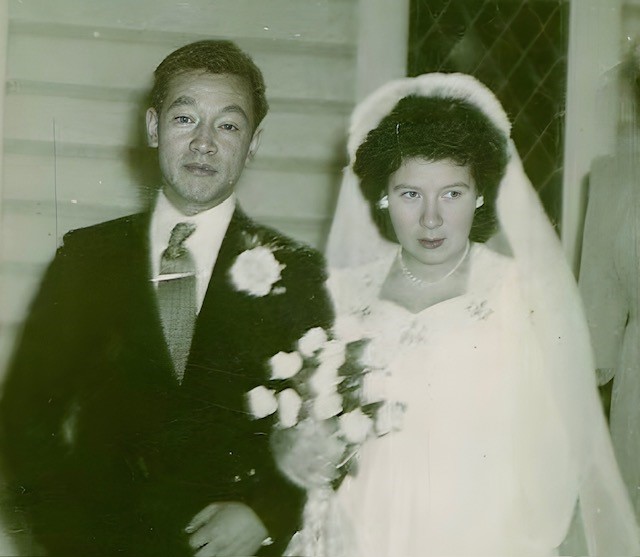
Philip and Rosy Morrison on their wedding day.
National Indigenous Veterans Day is on November 8. It's a day to commemorate the contributions of Indigenous veterans, particularly those who served in the First World War, the Second World War and the Korean War. On this day we recognize their contributions and sacrifices and acknowledge the unfair and unequal treatment they received from the government of Canada compared to non-Indigenous veterans. The First Nations Health Authority’s Jessica Mikolayczyk shares the story of her father, Philip “Smokey" Morrison (February 2 1923 – July 14 1981) from the Gitanmaax Band in Hazelton.
The pride in Jessica Mikolayczyk's voice is evident and comes across clearly when she talks about her father Philip Morrison. The words resilience and family aptly describe his life and how he lived, as well as the legacy and lessons he gave his children.
Philip displayed his resilience when he was sent to residential school with his siblings. The trauma from his time there was so much that he rarely spoke of what happened. Residential schools have been documented as purposefully keeping Indigenous children malnourished and perpetually hungry but Philip continued to show his resilience by running away and trapping for extra food to feed his siblings. In this way he found strength in purpose by focusing on his family.
Once Philip left residential school, his mother, Jessie Sterritt, took care of him and their family. But times were hard and food and money was scarce. To help out the family, Philip joined the army because it offered a stipend. That stipend was religiously sent back home to help his mother support their family.
Philip's intention to help his family by joining the army had long-lasting and negative repercussions for him though.
Jessica says they don't have much information about her father's time in the military.
“He never shared a lot about his experiences during the war, but he witnessed a great deal that caused considerable trauma that was in addition to his residential school experience."
Much later, Jessica learned that some of those traumas included seeing his close friends and comrades killed in combat. Fortunately, Philip wasn't physically hurt in combat and the one time he did get injured was one of the few stories he shared with his family.
Jessica tells the story, “when it was announced the war was over, he was so happy he jumped off a tank and broke his ankle."
Because Philip joined the army to financially help his family, it led to him becoming enfranchised. That meant losing his “Indian status" and without status, he also lost access to the benefits afforded to First Nations people at that time.
“Dad experienced a lot of marginalization and discrimination from both non-First Nations and some First Nations as he was in the middle of both worlds," says Jessica. “He didn't have status so wasn't recognized by his community. He also wasn't recognized as a veteran by the government of Canada so he wasn't given a veteran's pension and didn't receive any government supports that veterans were entitled to, due to being First Nation."
Those benefits included loans and grants for land and livestock, education, housing and mental health supports.
Jessica says losing “status" had a major impact on her family. It meant when her mother married her father, she also lost status and it meant Jessica and her seven siblings grew up without status either.
She says while it angered her father, it didn't make him an angry man or let it define his life.
“Dad and his other Indigenous friends who were vets bought land and built homes in Hazelton all on the same street and became known as the 'Field Street Gang," says Jessica. “They became their own support system and all the kids grew up together on the street in one big family." Jessica remembers her dad as being focused on family, building his own successful business building mills all over BC and passing on his carpentry skills to her brothers.
Despite serving in the army during the Second World War, his family knows very little about his experiences during that time, but it's telling of the deep and lasting impact that resulted in her father never attending a Remembrance Day ceremony.
The discrimination he faced in Canada and from being non-status led Philip to teach his children to be independent and self-reliant. He also instilled in them a pride in giving back to the community and to focus on what's important: family and resilience.
Jessica says family was always the one constant throughout her father's life – from running away from residential school to feed his siblings, to joining the army and sending his stipend back home. He showed resilience by pouring his attention and love into his family.
In telling her father's story, Jessica wants to highlight the struggle Indigenous veterans faced. They fought for a country that denied them basic rights and benefits when they returned home with many giving the ultimate sacrifice.
During the 20th Century more than 12,000 Indigenous (First Nations, Inuit and Métis) men and women served in the Canadian Armed Forces in the First World War (1914-1918), Second World War (1939-1945), and the Korean War (1950-1953) combined. Over 500 Indigenous people died in service to Canada during the conflicts. Indigenous people have also served in over 42 peacekeeping missions since 1956.1
1 https://www.veterans.gc.ca/en/remembrance/people-and-stories/indigenous-veterans
